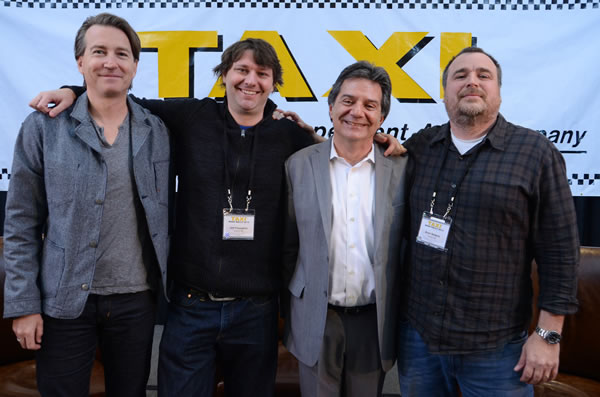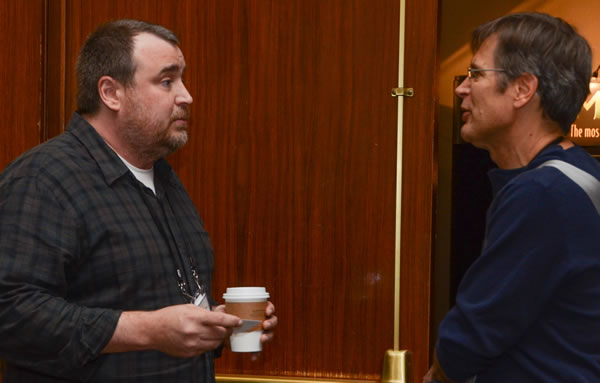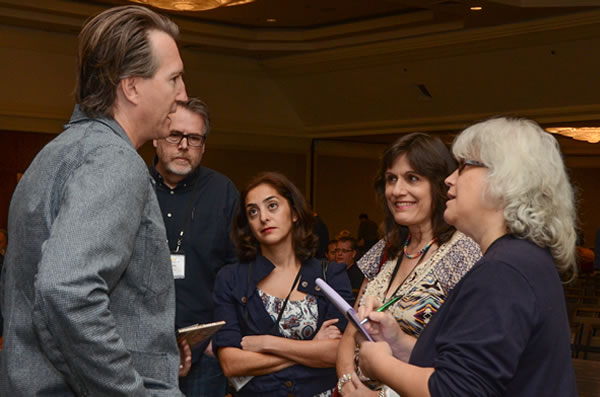Panel Members:
John Rudolph, Chairman, Elias Arts;
Jeff Freundlich, COO, Wired Whirled Music;
Brian McNelis, Sr.Vice President of Music and Soundtracks, Lakeshore Entertainment.
Moderator: Michael Laskow

The Keynote panelists take a moment to pose form a group shot after they finished their panel. (Left to right) John Rudolph, Chairman, Elias Arts; Jeff Freundlich, COO, Wired Whirled Music; Michael Laskow, CEO, TAXI; and Brian McNelis, Sr.Vice President of Music and Soundtracks, Lakeshore Entertainment.
I want to switch gears and go to Jeff on something. We have a lot of baby boomers that are TAXI members. These are people that were in garage bands as teenagers, and then they started life. They went to college, they got married and now they are heading toward retirement, and they are really getting back into their music. And they build a home studio, they are a little tech-challenged—some of them—but the tech is getting easier, and they’re becoming more confident with the whole package. Your company has become the go-to company when people need authentic, vintage music that dates back to a previous era. You saw the niche, you held it to very high standards, and more or less cornered the vintage music market as far as film and TV placements are concerned. A lot of the music in your catalog has come from our members, and a lot of them have demos from the ’60s, ’70s, and ’80s sitting in dust-covered boxes on shelves. Tell them what you look for, because we get this question all the time: "When they say vintage, can I submit a demo? Would that work? Do they need a 16-track master?" Please give them the rundown on what works, why it works, and how it gets used.
Jeff: We’re looking for music that’s quintessential to a specific era. So we have a ton of Rockabilly music from the 1950s, because that’s when Rockabilly really mattered. And we have a ton of Psychedelic Rock from the late ’60s, because that’s when people were tuning out and dropping, or whatever that whole thing was. I mean, that’s when it really mattered…
-Jeff Freundlich
John: When we were born.
Jeff: And I think like if you’re talking about the 1990s—like the quintessential eras of music in the 1990s might be like Grunge, New Jack Swing was still really important then. You can kind of look at these eras and say, "This is when this music really mattered." So it turns out that most music supervisors or directors or producers, if they had their druthers, they would use a hit song if they had the budget—a lot of times they don’t—maybe they’d look at [music] libraries, but they don’t necessarily want somebody that writes music in a cubicle that sounds like it came from 1973. They are not using the same micing techniques; the vibe is kind of like half-baked. It’s just hard to do that really, really well. And, honestly, I’ve written stuff like that and it’s gotten played, so I’m not knocking it; it’s a viable market to do that. But really, at the end of the day, isn’t it right to use music that’s from that time period, because it’s quintessential and because it matters and it’s the real thing? I mean, libraries get a knock. I get music requests every day, and they say, "I need a real artist bucket, and I need a library bucket." It’s like there’s a perception in this community that if it was done a long time ago that maybe it has a little bit more value and they are interested in using it.
I don’t really care if it was a demo, I don’t care if it was released or not released, I just want to hear it. We use the same software that the Smithsonian used to clean up—only if it’s not in the vocal where the hiss pops out—most cassette hiss is in a frequency above the vocal, and as long as it’s not in the vocal range, we can clean up a lot of that stuff and make it sound really good.
And there’s so much great music out there that deserves to be heard, and the stories deserve to be told. I mean, there are a bunch of people in this room that we’ve signed music from, and they’ve got amazing stories. They were managed by the guys that managed Three Dog Night; they got ripped off by Frankie Valli. And it’s like I want people to hear that music, and I want these guys making some money, and we’ve found an effective way of doing that.

Brian McNelis, Sr.Vice President of Music and Soundtracks at Lakeshore Entertainment (left) was very generous with his time and considerable expertise!
The last thing I’ll touch on is, why would they use our music? I’ll give you an example. There’s a TV show streaming on Amazon called Red Oaks. It takes place in the ’80s. It’s a really good show. We’ve probably had 25 or 30 placements on it. I’d say half of them were from TAXI members. I’m sitting with the music supervisor at dinner the other night, and I got the highest compliment from an executive at Warner Bros. He said, "You know the music felt so 1983, but I didn’t recognize any of the songs. Because if I hear a Journey song, I start thinking about Journey, I’m not watching the TV show anymore. I’m like, ‘Oh, I know that song. Oh, and that is that, and that’s Cameo.’" The thing is, it takes you out of the moment of the show or the film. So it turns out there is a huge market for vintage stuff, because it is so of that moment, but it’s not competing with the viewer’s attention for the program itself.
We started doing this back in 2007. All we had to do was listen to our clients who said, "We want more of this and less of this," and it was like, okay, here we go, and we were kind of off to the races. And that’s how we developed this particular product line.
But that’s why it works. It works because it’s not a hit, and there’s a huge market for non-hits, and I want all of your old tapes and cassettes, and I’ll go through every single one until I’m blue in the face, because in that batch there is gold in your closet and you don’t know it.
Brian or John: Cash for gold. [laughter]
-Jeff Freundlich
Some of our members have gotten huge checks from you. I always tell this story. For those of you who haven’t heard it at previous Road Rallies, we’ve got a gentleman who is a TAXI member who I believe is 92 years old. His hearing is failing; his eyesight is failing. The guy recorded music in the mid to late ’40s, and it’s been sitting on a shelf his entire lifetime waiting to see the light of day. We forwarded it to Jeff probably three or four years ago, and Jeff called and said, "Michael, I’ve been trying to get this guy on the phone." Well, the guy couldn’t see or hear his phone ring, so we finally tracked down the gentleman’s son, who is like my age or older, and through him we got to this older gentleman, and Jeff finally signed the stuff, and he’s had somewhere around 20 placements that anybody in this room would drool to have. And the guy called me up crying into the phone saying, "I don’t care if I never made a penny at this, but I’ve been waiting an entire lifetime to get my music heard by people." So Jeff and I have this bond, we really do. [applause]

John Rudolph, Chairman of Elias Arts (left), spends some time chatting with this very attentive group of TAXI members after his Keynote Interview ended.
Brian: I love that. As a music supervisor and film music executive, that’s the kind of stuff that we are often looking for, for those reasons. I love those stories. You know, a lot of times we’ll have a cue in a film, and somebody will say like, "Ah yeah, do we have something that kinda sounds like what we don’t want to pay for?" And the great thing about what Jeff is doing with that stuff—or if you have friends or relatives that have stuff in the closet—if you were making music in the ’60s of an era inspired by the same things that were happening there, it probably does sound like whatever. In every era, there are a lot of artists that sound like the era, but for whatever reason they didn’t get the hit, they didn’t get the recognition. Maybe some of them were signed to major labels, and back in the ’60s and ’70s there was great proliferation of independent labels before the big corporate consolidations got on, so there’s probably a lot more stuff out there. And I love the idea that those stories get told. That these people were every bit as passionate as their contemporaries went on to fame and success. But I bet that those recording were absolutely just great. And the one coda I’ll put on that is when I first got into this gig we had an issue with Motown/Stax kind of stuff. It was really expensive, and all the kind of cubicle jockey stuff was just really super lacking. I worked with a songwriter production team, and we did a record that is very much Motown/Stax. And it was an expensive project. It took us a year and a half to be engineered and worked, and to be indistinguishable from music from that era. It’s probably the only record in our catalog that actually people come to us and relicense out, because it is such a rare kind of thing.
-Brian McNelis
So I think that there actually might be a market like if somebody was so inclined to actually be able to do stuff really well, but it’s not those, "Hey Marty, get those kids in here. We need like, you know, the Marleys. So like the Reggae, I need four of those before lunch." [with a Bronx accent] You know, that kind of stuff was kind of worn thin, I think, even at television.
So what Jeff is doing has value, but I think that there’s also an added opportunity that if you or somebody you know is particularly good at audio recording and engineering—particularly at being able to match the sound of an era—was probably… Like this record that we did, we didn’t want anybody to know it was a library record, so we made up a whole back story about how its master tape was found. It was this little town called Shelbyville that was between Memphis and Detroit, and it was the gas station where everybody broke down. And so the guys who ran the gas station had like a two-track recorder in the back, and while the cars were like being repaired they would like jam in the back of the garage. We created a whole fiction around this thing so that people would buy the lie, and it worked. [laughter]
John: That’s not a lie. That’s the entertainment business.
I’ve got to tell you, Freundlich has the most amazing ears. I used to be an engineer and producer, worked in a very big studio, worked with a lot of big acts. I have good ears…reasonably good ears. Anyway, the stuff that leaves TAXI to go to Jeff, about 90% of the time I’ll get my ears on, because I want one more filter to make sure that he’s getting stuff that we think is really, truly authentically vintage. Stuff gets by me all the time, I send it to Jeff—that guy’s amazing. We did a panel two years ago and we played stuff. If I played it for you two guys and said, "Is this authentic or a re-make." We would all buy it as authentic, and Jeff would instantly detect it. And when we played it in the room compared to something of the same era in a similar style that was authentic, it was so incredibly obvious. So, as much as I like the fact that you are recommending people to do it, it won’t get signed by… [laughter]
-Jeff Freundlich
Jeff: But, you know, I think the thing is, if you were in a doo-wop group in the 1950s, you weren’t in the group if you couldn’t sing. Like now we like auto-tune everything; everything is kind of like fabricated. If you were singing doo-wop, you were like really frickin good, you know, or you didn’t make the cut.
So it’s great. There are some keyboard players in this room that are just like what?! And it’s like those guys deserve to make money on their craft, and they deserve to… And Peter Sivo, who is a brilliant arranger—he’s one of the members that Michael was talking about—he’s made tens of thousands of dollars on this stuff. It’s like, well, good for you. It’s like you put in the time to really learn your craft and do it better than a lot of other people were doing it at that time, and it’s timeless and it still works now, because the quality and the musicianship and the craft was there.
Well, gentlemen, with that I’ve got to wrap this up. Brian McNelis, John Rudolph, and Jeff Freundlich, you guys were amazingly informative today. Thank you so, so much for doing this, and I hope you’ll come back for another Rally. Thank you. [Applause]